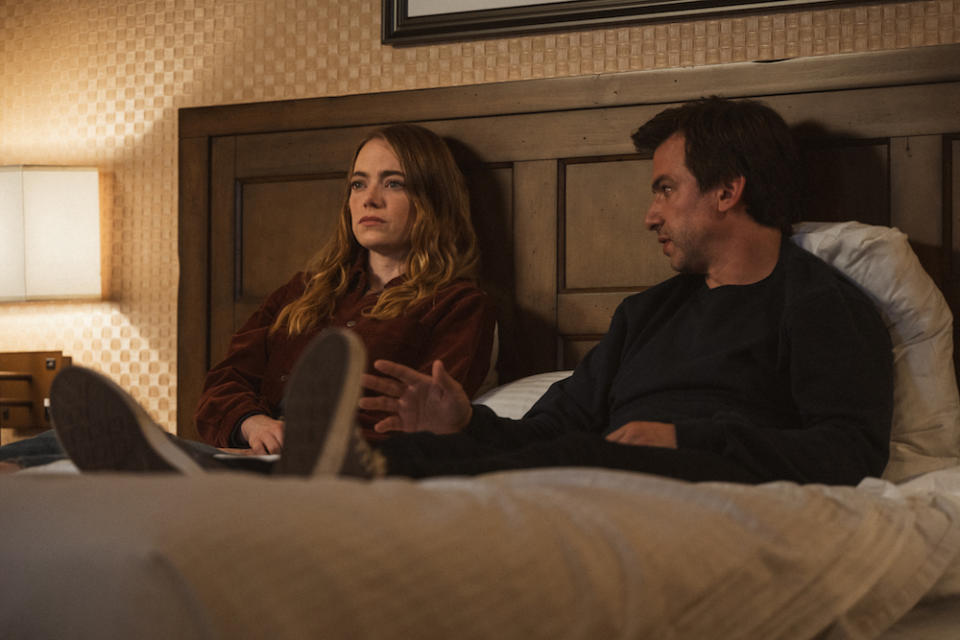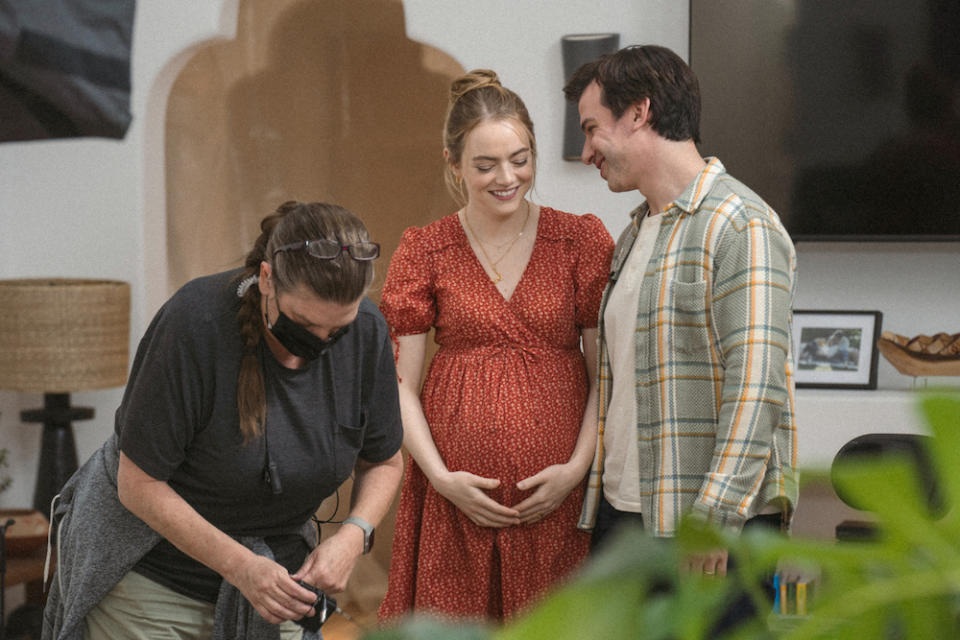‘The Curse’ Finale Soars to an Unforgettable Ending — Spoilers

- Oops!Something went wrong.Please try again later.
- Oops!Something went wrong.Please try again later.
- Oops!Something went wrong.Please try again later.
- Oops!Something went wrong.Please try again later.
[Editor’s Note: The following review contains spoilers for “The Curse” Episode 10, “Green Queen.”]
“We thought it was a sad thing, and it is a sad thing, but it’s also funny, too. Or there’s humor that could be found in it. Because art is about… really, art is about, um… sometimes you have to go to extreme lengths to make your point.”
More from IndieWire
In the above quote from Episode 10, Asher (Nathan Fielder) is struggling to describe Mel Brooks’ classic film “The Producers,” but he may as well be talking about “The Curse.” After all, Fielder and Benny Safdie’s impossible concoction of sad things and funny things elevates its tale of marital disillusionment and cosmetic social concerns to an extreme ending. The second half of Episode 10 is so remarkable, so unexpected, and so brain-bendingly bonkers it overwhelms everything that came before it. If you thought the Rachael Ray cold open was surprising, it’s the last thing on your mind by the time Asher is floating off into space.
“Sometimes you have to go to extreme lengths to make your point.” But what point, exactly, is “The Curse” trying to make? A proper explanation will require a bit of unpacking, but the simplest interpretation of the finale is that the titular curse finally caught up with Asher. Whether he is the curse (as Asher himself claims at the end of Episode 9) or the curse was cast upon him (as we all saw in the premiere), transcendent forces ultimately work to evict Asher — not just from his home, but from the planet itself. He is, by his own admission, a bad person — a blight on Española and a fool in his own home — so he deserves what’s coming to him. …right?
Even if that much can be agreed upon, questions around the ending still linger. Why now? Why him? And what (or who) caused his interplanetary expulsion? But focusing all our attention on Asher — as one is want to do, after witnessing such an extraordinary demise — is nearly a red herring. “Green Queen,” an oh-so-fitting title for Episode 10, is more concerned with Whitney than her high-flying husband. She’s been telling us what we need to know all along, often without saying a word, and her clarifying expressions, manifested so perfectly by Emma Stone, bookend the series in a way that sheds light on the story’s meaning.
Whitney’s Terror
Her first telling expression actually arrives at the end of Episode 9, when Whitney demands Dougie (Benny Safdie) show Asher the excised “pottery scene” from “Green Queen’s” pilot. Here, in this moment, she is trying to escape. She thinks that if Asher hears what she really thinks of him, of their relationship, that he’ll leave her. The show, the baby, the marriage itself — it’s all too much for her, and she decides to let the show do the talking for her. (I love that Whitney’s preferred version of telling the truth is one that’s been prerecorded, edited, and cut into a specific sequence. It’s how she always wants to be seen — not in reality, but through reality TV.)
But Whitney makes a mistake. She fails to realize just how much shit Asher can take. Being debased is his kink — shortly before heading to the hotel, he’s jerking off in the bathroom while imagining another man having sex with his wife. So when he sees how little Whitney thinks of him, rather than fight back, he doubles down on his allegiance. “There’s not some curse,” Asher proclaims. “I’m the problem, I’m a bad person, and I’ve been dragging you down with me.”

And there it is: the first look. Whitney stares back at her husband with such a potent combination of astonishment and terror, all she can do is nod along, agreeing to his pleas for reconciliation. But the tears spilling from her eyes tell a darker truth. How can he still want to be with her? How did she try to get out, only to find herself in deeper than before? How is this her life?
Eight months later (when the finale begins), the consequences of their hotel room confessional are stacking up. Season 1 of “Green Queen” is wrapped and rolling out. They’re getting ready to start production on Season 2, which got the green light despite the series only airing on HGTV Go. (“I’m so annoyed that we’re not on actual TV,” Whitney says.) To top it all off, Whitney is pregnant, and HGTV executives are already planning on including the newborn in upcoming episodes.
That’s bad news for Asher, but he doesn’t know it yet. He’s on cloud nine (not literally, not yet) — his show is out, it’s been renewed, the baby he’s always wanted is on the way, and he’s living in complete and total subservience to his beloved wife. Asher is happy. He’s so happy, in fact, he gets Whitney a “push present,” despite agreeing not to give her anything until after the birth. “I mean, I deserve it,” Whitney says, barely feigning sarcasm, before Asher unveils his gift, which is actually a gift for someone else: He’s giving Abshir (Barkhad Abdi) the house. “What makes you happy is other people being happy,” Asher says, as his wife barely tries to hide her disappointment.
Of course, giving Abshir the home goes badly — he doesn’t let them inside, he mainly cares about his newly inherited financial responsibilities (how rude of him to be thinking about money), and when Whitney thinks he’s crying in gratitude, it’s actually just dust in his eyes. Abshir does what any responsible adult should do when presented with a scenario that seems too good to be true: He hammers out the details, and makes sure he and his family are taken care of. That leaves Asher and Whitney feeling deflated, but who cares? It’s his house and his life, not theirs.
Soon after, in another “of course they did that” moment, Whitney and Asher sacrifice their home’s passive certification so the baby’s room can have air conditioning. (“Summers have been crazy!” Asher says. “We’re not going to gamble with his life.”) We even see how Asher has stepped up his (crazy) game when it comes to “defending” Whitney. (I really hope that construction worker wasn’t fired for a deadpan joke about divulging a stranger’s baby’s sex.) These scenes pull double duty: They serve as valedictories for the series, where the audience gets caught up on other characters and plot-lines, like resolving Abshir’s arc and finding out Cara (Nizhonniya Austin) quit the art world… and still gets profiled by The New York Times. (What a delicious ending for the advantageous former artist.)
Whitney’s Triumph
But they also lull us into a false sense of familiarity. Aside from the out-of-nowhere Rachael Ray introduction, the finale appears to be taking the shape of any other episode. So when Whitney wakes up to see her husband on the ceiling, it’s extra jarring. At first, it’s just strange, and it’s easy to believe the funky house with its pressurization areas could have caused him to float to the ceiling. But the longer he’s up there, the balance between absurdity and terror starts to tilt toward the latter.
Fielder’s direction is immaculate. Each failed attempt at a rescue only raises the stakes, especially when the most obvious solutions don’t work. (Asher climbing down Whitney’s body until they’re both suspended in mid-air… what a sight.) By the time he’s outside, you know it’s not just the house, but the ending is still an absolute wallop. Asher shoots up into the sky, higher and higher, as a baffled Dougie watches from below. Eventually, he either freezes to death or runs out of oxygen once he’s above earth’s atmosphere, and each unnerving shot that takes us there is perfectly executed. I jumped up in my seat the first time I saw Asher defy gravity, and I remained mesmerized during each subsequent viewing. (Massive props to Fielder, the actor, as well. Those pratfalls — especially when Asher jumps for the cell phone — are so, so funny. Incredible physical comedy.)

A lot happens at the very end of “The Curse.” Asher dies. Whitney gives birth. Dougie suffers another traumatic loss. But just before all that, in the quiet before the storm, comes Stone’s pivotal second look. They’re laying in bed, and Asher is singing to the baby while shining a light on her belly. Then he looks up and tells her, “There’s a little me inside of you.” At first, she just smiles politely, but then Whitney’s face goes blank, as if it took a second for his words to make sense. There’s another Asher inside of her. In a matter of days, she’ll be stuck with two of them. Her future, which has been theoretical since Asher recommitted to her in Dougie’s hotel room, is about to become undeniably real. Fear overwhelms her, but only for a second. Then she lays her head back, smiles slightly, and stares at her husband.
Did she… have an idea? Did she realize something that brought her comfort? Did she come to a decision? Just last week, in Episode 9, Asher promises that if Whitney decides she doesn’t want to be with him, “I’d be gone, and you wouldn’t have to say it. I would feel it, and I would disappear.”
And disappear he did. If you look back at Episode 10 from Whitney’s perspective, once it’s all over, a few things become clear (or clearer). Mainly, that the world is bending to her will. She had the baby. Better still, she’s happy with the baby. Stone’s glowing visage upon seeing her newborn son may seem like the most normal part of the finale, but it wasn’t exactly a given. She didn’t want to have a child — or, at least, she didn’t want to have a child with Asher. But when she’s handed the little boy, she’s smiling, crying with joy, and staring up toward the sky. She’s relieved the birth is over, sure, but it seems like more than that. Perhaps she’s relieved she did it without any help? Without Asher in the room? Without Asher… at all? She doesn’t know what happened to him, exactly, but maybe she knows he’s fulfilled his promise. By not being in the delivery room, he’s telling her he sensed what she wanted, and he disappeared.
Maybe, in those final moments, she can sense that he’s gone, or maybe she just knows, after going through this ordeal without him, that she doesn’t need Asher. Not anymore. Not in the way she was afraid she did. Whitney leaned on Asher throughout “The Curse,” but whether she ever needed him is debatable. She had the money from her mom and dad. She had the experience in real estate. She had the passive home designs, and she’s the only one who can properly host an HGTV show. Now, she sees that she can have all that without him. And she’s never been happier.
Asher’s Erasure
With that, let’s talk about Asher. “The Curse” makes sure to include multiple comparisons between Asher and the baby. There’s the line about Whitney having “a little [Asher]” inside of her, but there’s also Asher shouting down to her, “Focus on the baby in your belly, not the baby in the tree,” before resurrecting that horrible “wah wah” crying sound he first made in comedy class. Instead of becoming Asher’s heir, the baby becomes his replacement. The baby can be her new male companion. The baby can share the screen with Whitney in “Green Queen” Season 2. The baby can grow up to become a “better” version of Asher — one raised by Whitney, instead of infatuated with her.
Maybe then, the baby can do what Asher cannot: He can serve a purpose. What struck me about Asher by the end of “The Curse” is that, yes, he becomes more pitiable as the show goes along — as Whitney’s longstanding selfishness comes to light — but he also becomes entirely expendable. Unnecessary. Useless.
By the time he flies off into the sky, it’s as if he’s already a human void. He’s so deferential to Whitney, believing whatever she believes and doing whatever she wants done, that his individual purpose is essentially eradicated. He gave Whitney a baby, sure, but that job is done. What good is he now? A caretaker? Whitney has her parents and can clearly afford to hire a nanny. She doesn’t need Asher (and she certainly doesn’t want him). OK, so what about the show? Don’t they still need him for “The Green Queen”? The title offers enough of an answer: What once was a show with two hosts called “Fliplanthropy” is now a show with a single titular lead, the Queen… and her jester. But what good is a jester who’s not even funny? A jester who’s kicked out of comedy class? Surely, the baby can fill the void of a cute and lovable sidekick better than that guy.
Perhaps most importantly: What good is Asher to the world? He’s buying up land to sell at a higher cost. He’s renovating homes that no one wants to buy. (“Are these homes bad for babies?” their construction worker asks. “Then why are we doing all this?”) His only personal ambition is dictated by his wife, and the only thing we know he really wants is a child. To that end, Asher is a brutal embodiment of white privilege. He takes and takes, without giving back. He spreads his vacuous influence by securing property and spreading his seed. He doesn’t care who he hurts, so long as his family is protected. There are so many Ashers out there already. Whitney just gave birth to another one. So who needs this guy?
That “The Curse” still makes us squirm as Asher begs the firefighter not to saw through the branch keeping him tied to this earth makes clear that the series itself is not without heart. I was also deeply uncomfortable watching Whitney “win,” knowing what kind of influence she would perpetuate via her kid. (Another white real estate tycoon! This time with TV’s money and influence! Oh nooooo!) Plenty of TV and movies packed with commentary can get lost in the darkness, numbing viewers with their nihilism or belaboring the same sad points over and over. Fielder and Safdie have a lot to say, and they use every tool in their arsenal to say it. Comedy, drama, suspense, the supernatural, and even outright horror. They’re all on the table.
Still, like Asher struggling to reconcile the cognitive dissonance within “The Producers,” “The Curse” often defies explanation. There’s no logical argument for Asher shooting off into space. There’s no accounting for the chicken on the firehouse sink, or for the mean little girl at school who Nala (Hikmah Warsame) cursed into falling down. There’s no definitive reading of the camera’s indistinguishable perspectives, like the car that followed Whitney or the very last shot of the series, out through the hospital, back to Asher and Whitney’s house. There’s no one way to take the finale’s extraordinary ending. (Did Whitney curse Asher? Did Dougie? Did Asher curse himself?)
But it’s sad and funny, honest and satirical, utterly fantastic and all too real. It holds up mirror after mirror (like Whitney’s homes, hello) and you either see yourself in the distorted reflection, or spot others in the distorted, spectacular, alien images. “The Curse” is about a troubled marriage, pillaged cultures, the American way, and so much more. It gets bigger and broader as it goes, even as the narrative zeroes in on its central couple. Sometimes, art has to go to extremes. “The Curse” does exactly that, well beyond its ending.
“The Curse” is available to stream on Paramount+ with Showtime.
Best of IndieWire
Sign up for Indiewire's Newsletter. For the latest news, follow us on Facebook, Twitter, and Instagram.

